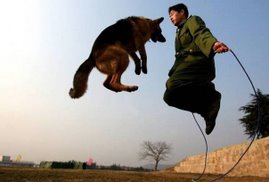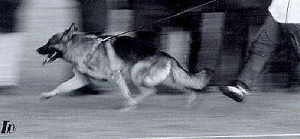Canine Flu outbreak in NJ
Please forward to your friends in NJ and the tristate area -
......................................................
There is a reported Canine Flu outbreak in NJ. There is a news story
up on the Best Friends Network NJ Community.
http://network.bestfriends.org/newjersey/news/27140.html
.................
New Jersey
Health Alert: Canine Flu outbreak in New Jersey
July 15, 2008 : 7:09 AM
Since the June 19th notification that canine influenza was identified
at a Burlington County boarding kennel, additional outbreaks have been
identified in Sussex and Mercer County. At this time, several hundred
dogs have become ill with one reported fatality associated with these
outbreaks.
On July 3rd, the Pet Spa Kennel in Hardyston received the confirmation
they had been both expecting and dreading that they had been hit by
Canine Influenza, otherwise known as the Canine Flu.
The kennel had already called and canceled all their boarders for a 2
week period from July 1-14th, and had hired their Veterinarian, Karen
Dashfield DVM to assist in both elimating this disease from their
kennel, and treating those clients who were sickened by the disease.
Shut down of a kennel is an essential tool to eliminate canine flu, as
the dogs themselves are the way the disease is spread as the virus
dies very quickly outside the body.
Veterinarians who identify cases of canine influenza outbreaks are
asked to notify the Department's Infectious and Zoonotic Disease
Program and work with the local health department with jurisdiction if
the outbreak involves a kennel, shelter, pet shop or pound.
What is Canine Influenza? To paraphrase current information, it is a
new virus that mutated from horse flu in early 2002 from what we
currently know. It was first identified in 2004, in outbreaks of
respiratory disease in greyhound tracks in Florida.
Dogs have no natural immunity, and there is no vaccination available,
so the disease is close to 100% infective. 80% of exposed dogs will
become clinically ill, with symptoms ranging from a cough and nasal
discharge with low grade fever (most cases) to high grade fever and
pneumonia (a small percentage of cases).
The most current information is that 1-5% of the dogs that get the
severe disease (high fever and pneumonia) will die from their
infection, even with intensive care. 20% of the dogs become
asymptomatic carriers and never show signs. Once exposed to Canine
Influenza a dog should be isolated from all other dogs for 2 weeks,
even if it NEVER shows any signs!
Canine Influenza last for 8 - 12 hours on skin, 24 hours on clothing,
and 48 hours on hard surfaces
Does having a Canine Influenza outbreak reflect on a kennel's
cleanliness? NO. Canine Influenza is carried by dogs, is airborne, and
does not live long in the environment. No matter how clean a facility
is, they are powerless to prevent the entry of this virus into their
facility.
The best a kennel/ shelter can do is to turn away dogs that arrive with
a cough, and immediately isolate any dog that starts coughing during
their stay. Unfortunately 20% of the dogs are asymptomatic carriers,
so the perfectly healthy dog that comes and goes without a cough can
infect a whole kennel!
How is Canine Influenza Treated? As the actual "flu" is a virus, it
has to run its course. Dogs are prone to secondary bacterial sinus
infections, and the dogs that develop pneumonias are usually secondary
bacterial pneumonias, so broad spectrum antibiotics or combinations of
antibiotics are a main stay of treatment.
Cough suppressants are often used, however it is actually detrimental
to use high powered cough suppressants, as the whole purpose of the
cough is to clear the airways of toxic substances and mucous.
Robitussin type compounds and mucolytics (which loosen up the mucous)
may offer some relief. Intravenous fluids are appropriate for dogs
that develop pneumonia, and some dogs with pneumonia require
nebulization therapy.
How do I prevent my dog from getting Canine Influenza? The only real
answer is to keep the dog at home and avoid all contact with other
dogs..... But as most of us choose not to live as hermits in the dog
community, the answer is that you can't. Hopefully there will be a
vaccine soon. In the mean time, all you can do is be careful.
Avoid places where large numbers of dogs of unknown status congregate.
While dog parks are a wonderful idea, they are a huge mixing ground
for diseases. Small neighborhood playgroups of known dogs and people
at your yard or a neighbor's yard are a safer bet. When taking your
dog for walks and to the pet store, avoid direct contact with other
dogs. If your dog is exposed to a coughing dog, assume that your dog
is contagious for 2 weeks, and keep it isolated, even if it doesn't
show signs.
When having your dog groomed, boarded, or stay in daycare, ask
specifically if they have had any sick/ coughing dogs in their
facility in the last 2 weeks. Business owners are not always up front
about this, but you would be surprised how many are, especially if
asked directly.
When going for a vet appointment, where appropriate check in and sit
well away from the other dogs in the waiting room, or if you feel the
area is too crowded, let the staff know you are waiting outside. If
you hear a dog coughing in a public forum, steer clear, and advise the
people in charge so that animal can be removed.
Finally, what should you do if your animal care facility has a severe
outbreak of "kennel cough" type disease? Immediately isolate all
coughing animals. Seek Veterinary care immediately for these dogs, and
ask your supervising veterinarian to test for canine flu- the NJ State
Department of Agriculture Lab will run this test- blood is best, but
it takes 7 days for a dog to develop a positive titer. If you live
outside New Jersey, other state's have both commercial and health
department labs that will run these tests. Dogs that just got sick
will require 2 tests, one now, and one in 2 weeks.
Dogs that got sick 7 or more days earlier will likely test positive if
they have flu. DON'T bury your head in the sand and hope it will go
away... if its canine flu the outbreak will just get worse if you
ignore it, and dogs will die! In order to control this disease, we
need to recognize it quickly, admit to having it when it occurs so
people can take proper precautions to prevent further spread, and work
closely with veterinarians and the public to minimize the damage the
outbreak causes.
Veterinarians who are overseeing disease control at kennels, shelters
and other animal facilities should review the sanitation and infection
control practices with management staff at these facilities. Suspect
canine influenza cases should be placed in respiratory isolation
(different airspace) from other canines as soon as possible and
examined by a veterinarian.
Suspect cases should treated and remain in respiratory isolation until
their shedding period is over: a 10-14 day period post-onset date is
recommended to be on the safe side, assuming the dog has recovered.
Exposed dogs should be quarantined for 10-14 days after their last
exposure and monitored for onset of clinical signs. The owners of all
potentially exposed dogs not being quarantined at a facility should be
notified and told to consult with their veterinarian if their dogs
develop signs of respiratory illness. Owners should isolate ill dogs
from other dogs and also exclude them from places where dogs
congregate, such as dog parks.
The UC Davis Koret Shelter Medicine website has information sheets on
various health and emergency issues you may run into, including the
Canine Flu.
Animal facility staff and veterinarians should institute infection
control practices, emphasizing proper hand washing, to avoid
inadvertent spreading of the virus. The facility should be ventilated
as much as possible and thoroughly cleaned and disinfected (including
potentially contaminated objects such as food and water bowls, toys,
etc) with quaternary ammonium products, a 10 percent bleach solution
or other cleaning compounds with strong antiviral properties.
Veterinarians can submit diagnostic specimens from suspect cases to
the New Jersey Department of Agriculture (NJDA), Animal Health
Diagnostic Laboratory for testing. More information on laboratory
testing is available here:
http://www.state.nj.us/agriculture/divisions/ah/pdf/feeschedule.pdf or
by calling 609-292-3965.
If you have any questions or to report an outbreak, please contact Dr.
Faye Sorhage or Dr. Colin Campbell, NJDHSS, Infectious and Zoonotic
Disease Program via phone (609)-588-3121 or email:
faye.sorhage@doh.nj.state.us or colin.campbell@doh.state.nj.us.
end


